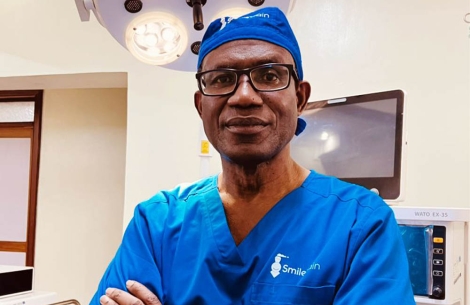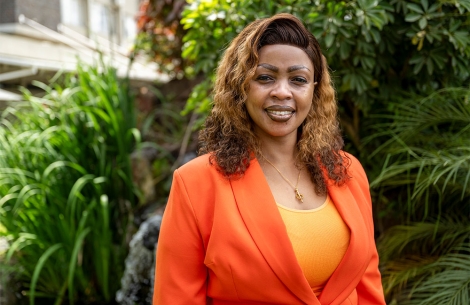Dr. Adeola Olusanya: Cleft Surgeon Who Doubles as Cleft Speech Therapy Provider for the Love of Her Patients

Dr. Adeola Olusanya is a Smile Train Partner based in Ibadan, Nigeria. She is a cleft surgeon with a special love for her cleft patients. She trained as a Cleft Speech Therapy Provider when she discovered some of her patients were not improving despite surgery.
She intimates about how she became a cleft speech provider, the successes and challenges she faces, how the collaboration with Smile Train takes other healthcare professionals to the next level in providing comprehensive care for children with clefts, and much more.
Can you tell us about your background and how you became a speech therapist?
First, let me say I am not a speech therapist, as there’s a lot more to speech therapy than cleft care, as I have come to realize. I am a Cleft Speech Therapy Provider, what some may call an ‘Interventionist.’ I came into the world of speech therapy when my patients (I am primarily a cleft surgeon) were not improving despite surgery. In past years, I referred my patients to speech therapists not involved in cleft care, but they kept returning after months of therapy with no improvement. In 2018, I got to know about an upcoming Smile Train-sponsored training on cleft speech therapy. I had been so curious about cleft speech that I enrolled. It showed me the path to good speech!
What motivated you to become a Smile Train partner and provide services to children with clefts?
Clefts can be healed. It is my passion to put smiles on my patients’ faces. Particularly gratifying for me is when speech therapy helps someone speak who only received cleft surgery later in life. The transformation that occurs when an individual who had been speaking through their nose or throat begins to speak normally through their mouth after therapy is almost unreal! This magic never fades for me — it’s amazing with every single case! Recreating this magic every now and then motivates me to push on in this work. I partner with Smile Train because Smile Train is just an amazing organization! They do not just come around, hand you a fish, and leave. Smile Train teaches local professionals how to fish and provides the resources to cook it, too! What more could I ask for? They are just awesome!

Why do you think speech therapy is essential for children with clefts?
Speech is an essential tool for any human. It’s how we integrate socially and, in some instances, how we accept others. The nature of any individual’s speech can, therefore, impact how the person is viewed and received by society. A good surgical result is the foundation of recovery from a cleft, but speech therapy builds the house, so to speak. It is, therefore, essential that children with clefts be given the opportunity to fully rehabilitate their speech. The cleft journey cannot be limited to surgery alone.
How do you approach speech therapy for children with clefts? Can you share some techniques or strategies you use?
Each child’s speech needs are as similar as they are diverse. Therefore, the need for individual initial speech assessment cannot be overemphasized. Personally, what is key to me at the beginning of speech therapy is the establishment of oral airflow. Also important is the speech hierarchy, starting with the child being able to differentiate correct speech sounds from the incorrect ones that they are producing. My favorite strategies for establishing oral airflow utilize visual cues — a piece of tissue on the mouth that deflects when the child makes a sound or a small white ball of cotton wool in a black bowl that scurries about when the child speaks towards the bowl. The latter strategy I call ‘mouse in a bowl.’ It is usually fun to use.
What challenges do you face when providing speech therapy to children with clefts in Nigeria? How do you overcome these challenges?
The main challenge I have experienced is not being able to objectively check if a surgically healed palate can accommodate good speech. For this, we will need more advanced equipment than currently exists in many parts of the country. Other challenges are somewhat minor; for instance, most of my child patients tend to be rather shy and therefore do not readily engage in enough conversation to enable a speech assessment. To overcome this, I have had to become a kindergarten teacher as well as a toy repository.

Can you share a success story of a child who had Smile Train-supported speech therapy?
A story that resonates with me is of a little boy who had had two surgeries on his cleft palate before coming to our clinic. His speech was very disheartening. This situation was further compounded because his younger sister developed cleft speech patterns from imitating him, even though she was not born with a cleft! They both were a significant source of worry to their mother, who does not earn very much. We gave the little boy an additional palate surgery followed by intensive speech therapy at no cost to his family, including transportation support every time he visited the clinic. He gained so much confidence that, at one of our psychosocial programs, he gave a solo song performance that was so emotional it had us in tears! Now when he speaks, I cannot but marvel at the transformation of his speech. In his words, this transformation would not have been possible without Smile Train!
How has being a Smile Train partner impacted your professional career and your personal life?
Being a Smile Train partner has helped me to realize a number of professional goals and helped stretch the envelope of cleft care in my local environment. The partnership has enabled interactions with other specialties involved in cleft care, which I have come to appreciate and respect. Personally, the partnership has allowed me to think outside the box to help provide my patients with cleft treatment that compares favorably to the best care offered anywhere else on earth.
What is your vision for the future of speech therapy for children with clefts in Nigeria?
My hope is that sometime in the not-so-far future, impactful speech therapy services will be available locally to every child in need. And that there will be more speech-language pathologists who are trained to deliver cleft speech services in Nigeria and in Africa in general.

How do you collaborate with Smile Train and other healthcare professionals to provide comprehensive care for children with clefts?
I think I am uniquely positioned to care for my patients with clefts. Being primarily a surgeon, my venture into speech therapy provides insight for me to be mindful of the patient’s speech needs while planning for their palatal surgery. This, I believe, is very important. I presently advocate for a surgeon and speech-language pathologist pair to be present in planning every cleft palate surgery. In the course of my experience, another specialty that calls for close interaction with speech is orthodontics. It can be challenging at times to plan the timing of the interventions for patients who need both specialties. Therefore, it is very important for cleft care professionals to develop a smooth understanding of what treatment comes first and which can occur simultaneously to enable optimum care for their patients.
What message do you have for other speech therapists or healthcare professionals considering becoming Smile Train partners?
Being a Smile Train partner has made my professional journey easier in terms of resource support and training with eventual job satisfaction. I readily recommend this partnership to professionals involved in cleft care.
Final words?
I wish to commend Smile Train for helping us (patients and care providers alike) reach beyond our boundaries. Your model of comprehensive cleft care touches more lives than you know. On behalf of my professional colleagues, our patients, and their relatives, I say thank you for being you!



